-
 Bitcoin
Bitcoin $82,099.5826
-1.34% -
 Ethereum
Ethereum $1,817.9545
-1.07% -
 Tether USDt
Tether USDt $0.9999
0.02% -
 XRP
XRP $2.0815
-3.96% -
 BNB
BNB $595.8647
-1.53% -
 Solana
Solana $124.0327
-0.92% -
 USDC
USDC $1.0000
0.01% -
 Dogecoin
Dogecoin $0.1634
-3.94% -
 Cardano
Cardano $0.6445
-4.65% -
 TRON
TRON $0.2336
1.34% -
 Toncoin
Toncoin $3.9381
2.61% -
 Chainlink
Chainlink $13.2201
-3.75% -
 UNUS SED LEO
UNUS SED LEO $9.0947
-5.84% -
 Stellar
Stellar $0.2646
-1.90% -
 Avalanche
Avalanche $18.6234
-3.91% -
 Shiba Inu
Shiba Inu $0.0...01214
-3.88% -
 Sui
Sui $2.2126
-6.78% -
 Hedera
Hedera $0.1604
-6.61% -
 Polkadot
Polkadot $4.0237
-1.97% -
 Litecoin
Litecoin $82.1655
-4.48% -
 MANTRA
MANTRA $6.2849
-1.13% -
 Bitcoin Cash
Bitcoin Cash $298.8203
-2.66% -
 Dai
Dai $1.0000
0.02% -
 Bitget Token
Bitget Token $4.4293
-4.57% -
 Ethena USDe
Ethena USDe $1.0000
0.01% -
 Pi
Pi $0.6976
-9.77% -
 Hyperliquid
Hyperliquid $12.5853
-0.74% -
 Monero
Monero $215.4717
-0.22% -
 Uniswap
Uniswap $5.8825
-1.85% -
 Aptos
Aptos $5.1958
-2.29%
How to manage NFTs in Trust Wallet?
Trust Wallet supports NFT management, allowing you to store, view, and interact with NFTs on supported blockchains like Ethereum and Polygon, with security best practices crucial for safety.
Mar 28, 2025 at 10:00 pm
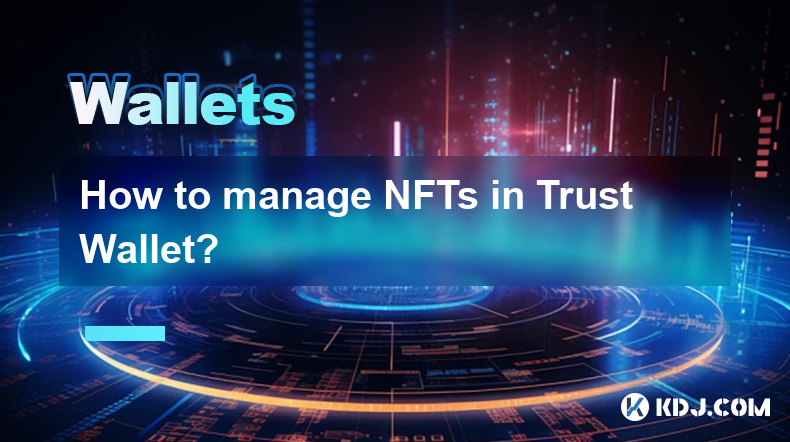
Understanding NFT Management within Trust Wallet
Trust Wallet, a popular mobile cryptocurrency wallet, offers built-in support for managing Non-Fungible Tokens (NFTs). This means you can store, view, and in some cases, even interact with your NFTs directly within the app. However, the functionality is dependent on the specific blockchain your NFT resides on and the NFT's inherent properties. Not all NFTs are created equal, and therefore, management can vary.
Accessing Your NFTs in Trust Wallet
First, ensure you have the latest version of Trust Wallet installed on your device. Once opened, you'll typically find your NFT collection under a dedicated tab, often labeled "Collectibles" or similar. This section will display your NFTs, showing their image previews (if available) and basic information like the name and the blockchain they're on. If you can't locate this section, check the app's settings or FAQ for guidance. Remember to always double-check the legitimacy of the app and website before interacting with your NFTs.
Viewing Your NFT Details
Clicking on an individual NFT will usually open a detailed view. This usually shows a larger image, the token ID, and potentially a link to the NFT's page on the marketplace or blockchain explorer where it was minted. Carefully review all details to ensure they match your expectations and confirm the authenticity of your NFT. The level of detail provided can vary depending on the NFT and the blockchain it's on.
Sending and Receiving NFTs
Trust Wallet allows for the sending and receiving of NFTs. To send an NFT, you'll typically need the recipient's wallet address. Be extremely cautious when entering addresses, as sending to the wrong address is irreversible. The process usually involves selecting the NFT you wish to send, entering the recipient's address, and confirming the transaction. Receiving NFTs involves simply accepting the transaction sent to your wallet address.
Interacting with NFTs
Some NFTs offer interactive elements, such as accessing gated content or participating in community events. The ability to interact with these elements directly within Trust Wallet depends on the specific NFT and its smart contract. Always verify the legitimacy of any interaction requests before proceeding. You might need to use a browser extension or visit the NFT's official website for full functionality.
Supported Blockchains and Marketplaces
Trust Wallet supports a range of blockchains, including Ethereum, Binance Smart Chain, Polygon, and others. The specific blockchains supported may change over time, so check the Trust Wallet website or app for the most up-to-date information. Ensure the blockchain your NFT resides on is supported by Trust Wallet before attempting to manage it. The wallet's integration with various marketplaces allows for easier viewing and management of NFTs purchased from these platforms.
Troubleshooting Common Issues
- NFT not showing: Ensure the blockchain your NFT is on is supported by Trust Wallet. Check your internet connection and try restarting the app.
- Transaction failures: Double-check the recipient's address and the network fees. Insufficient funds can also cause failures.
- Unable to interact with NFT: The NFT's functionality may require interaction outside of Trust Wallet, such as through a browser extension or the NFT's official website.
- Security concerns: Only download Trust Wallet from official app stores. Be wary of phishing attempts and never share your seed phrase.
Security Best Practices for Managing NFTs in Trust Wallet
- Enable two-factor authentication (2FA): This adds an extra layer of security to your wallet.
- Regularly update the app: Updates often include security patches and bug fixes.
- Never share your seed phrase: Your seed phrase is the key to your wallet and should be kept completely confidential.
- Be cautious of phishing scams: Always verify the legitimacy of any websites or emails asking for your wallet information.
- Use a strong password: Choose a password that is difficult to guess and keep it separate from other passwords.
Frequently Asked Questions
Q: Can I use Trust Wallet to buy NFTs?
A: Trust Wallet itself doesn't directly facilitate NFT purchases. You typically buy NFTs from marketplaces and then transfer them to your Trust Wallet for storage.
Q: What happens if I lose my phone with Trust Wallet?
A: You should have written down your recovery phrase (seed phrase). Without it, you will lose access to your NFTs and other cryptocurrencies stored in the wallet.
Q: Are my NFTs safe in Trust Wallet?
A: Trust Wallet employs security measures, but the safety of your NFTs also depends on your own security practices. Following security best practices is crucial.
Q: Can I see the value of my NFTs in Trust Wallet?
A: Trust Wallet may display a price estimate for some NFTs, but this is not always accurate and can fluctuate. For precise valuation, you should check dedicated NFT marketplaces.
Q: Can I stake my NFTs in Trust Wallet?
A: Staking functionality depends on the specific NFT and its smart contract. Not all NFTs support staking, and Trust Wallet's support for NFT staking may vary. Always check the NFT's documentation.
Q: What if an NFT I own is on an unsupported blockchain?
A: You'll be unable to manage that NFT within Trust Wallet. You'll need a wallet compatible with that specific blockchain.
Disclaimer:info@kdj.com
The information provided is not trading advice. kdj.com does not assume any responsibility for any investments made based on the information provided in this article. Cryptocurrencies are highly volatile and it is highly recommended that you invest with caution after thorough research!
If you believe that the content used on this website infringes your copyright, please contact us immediately (info@kdj.com) and we will delete it promptly.
- The Crypto World Has Many Choices for Investors Who Want Safe Gains
- 2025-03-31 21:20:13
- Dogecoin (DOGE) Has a Turbulent Start to March, But Technical Indicators Hint at a Potential Bullish Turnaround
- 2025-03-31 21:20:13
- Dogecoin (DOGE) and Shiba Inu (SHIB) Whales Are Dumping to Buy Coldware (COLD)
- 2025-03-31 21:15:12
- Australia's financial crime regulator warns cryptocurrency ATM providers that many of these machines may be facilitating money laundering or defrauding victims
- 2025-03-31 21:15:12
- As Sui (SUI) Prepares to Unlock $151M, Coldware (COLD) Quietly Captures the Next Billion Users
- 2025-03-31 21:10:12
- Cryptocurrency investors are increasingly moving capital into stablecoins and tokenized real-world assets (RWAs)
- 2025-03-31 21:10:12
Related knowledge

How to easily generate a Bitcoin payment address
Mar 29,2025 at 10:49am
Generating a Bitcoin payment address might seem daunting, but it's actually quite straightforward. This process is crucial for receiving Bitcoin, as each transaction requires a unique address. Understanding how this works is fundamental to using Bitcoin effectively. This guide will walk you through the simple steps, regardless of your technical experti...
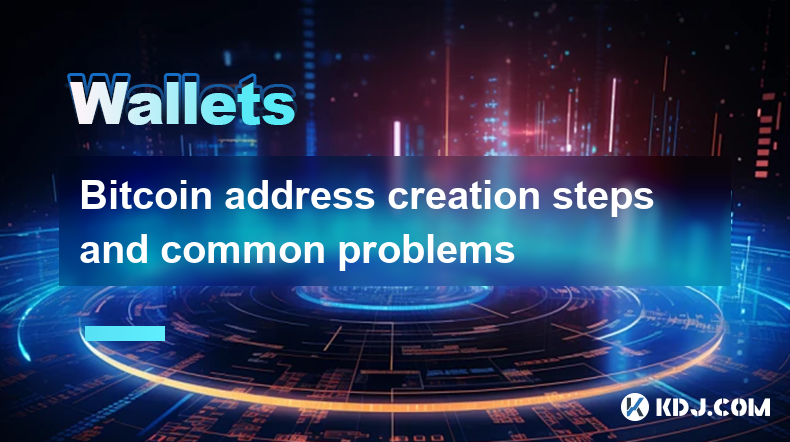
Bitcoin address creation steps and common problems
Mar 30,2025 at 06:07am
Understanding Bitcoin AddressesA Bitcoin address is a unique identifier, similar to a bank account number, used to receive Bitcoin. It's a string of alphanumeric characters generated from a public key, derived from your private key. Understanding the distinction between public and private keys is crucial for Bitcoin security. Your private key should be...
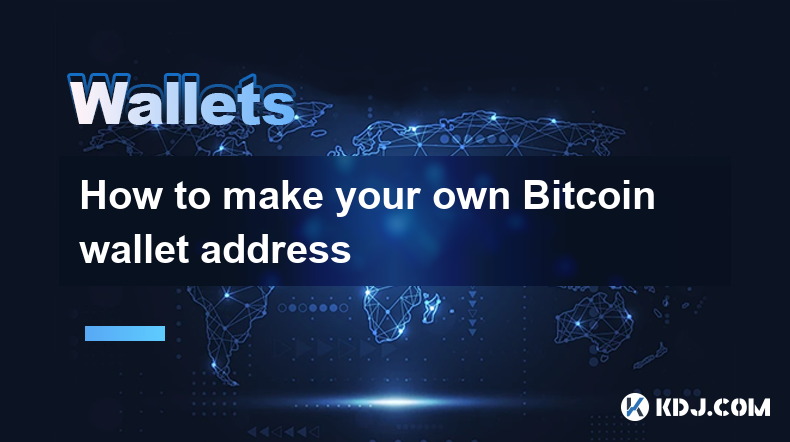
How to make your own Bitcoin wallet address
Mar 29,2025 at 08:42pm
Creating your own Bitcoin wallet address is crucial for securing and managing your Bitcoin holdings. It allows you to independently receive and send Bitcoin without relying on third-party services. This process involves understanding the different types of wallets and choosing the one that best suits your needs and technical expertise. Incorrectly gene...
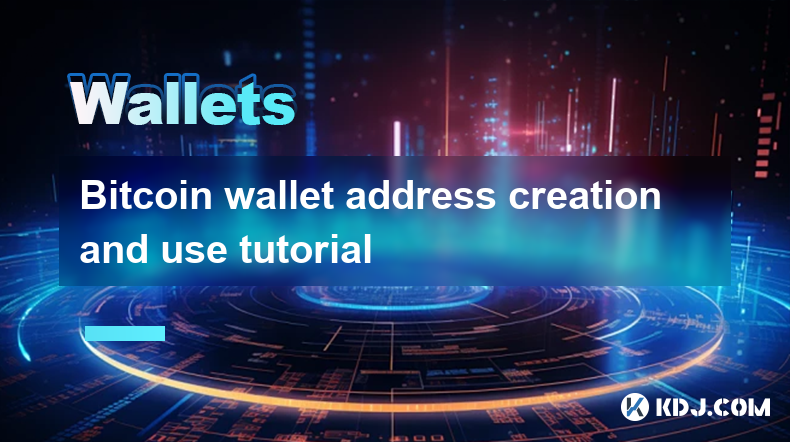
Bitcoin wallet address creation and use tutorial
Mar 29,2025 at 10:14pm
Understanding Bitcoin Wallet AddressesA Bitcoin wallet doesn't store Bitcoin in the way a traditional bank account does. Instead, it stores private keys, which are cryptographic secrets allowing you to access and spend your Bitcoin. Your Bitcoin address, on the other hand, is a public identifier, like an email address, that others can use to send you B...

Bitcoin address generation and secure storage guide
Mar 30,2025 at 08:07am
Understanding Bitcoin AddressesA Bitcoin address is essentially your public key, a string of alphanumeric characters used to receive Bitcoin. It's analogous to your bank account number. Unlike your private key, which is crucial for spending your Bitcoin, your address can be shared publicly without compromising your funds. Generating a new address is sim...
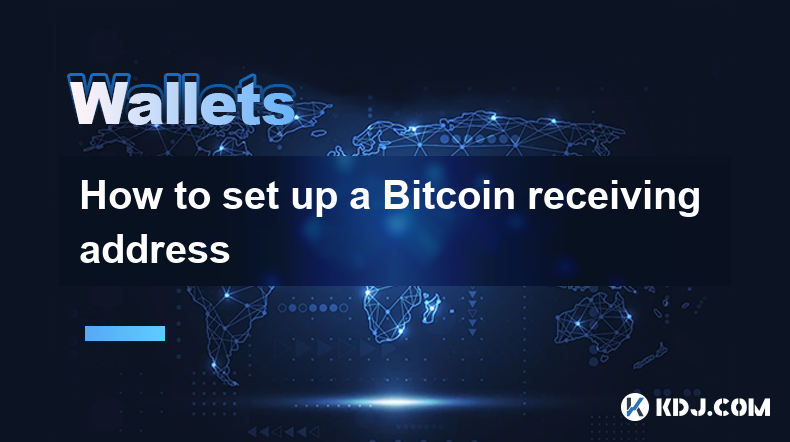
How to set up a Bitcoin receiving address
Mar 30,2025 at 06:14pm
Understanding Bitcoin Receiving AddressesA Bitcoin receiving address is essentially your unique identifier on the Bitcoin network. It's a string of alphanumeric characters that allows others to send Bitcoin to you. Think of it like your bank account number, but specifically for Bitcoin. You need a receiving address to receive Bitcoin. Crucially, you ca...

How to easily generate a Bitcoin payment address
Mar 29,2025 at 10:49am
Generating a Bitcoin payment address might seem daunting, but it's actually quite straightforward. This process is crucial for receiving Bitcoin, as each transaction requires a unique address. Understanding how this works is fundamental to using Bitcoin effectively. This guide will walk you through the simple steps, regardless of your technical experti...

Bitcoin address creation steps and common problems
Mar 30,2025 at 06:07am
Understanding Bitcoin AddressesA Bitcoin address is a unique identifier, similar to a bank account number, used to receive Bitcoin. It's a string of alphanumeric characters generated from a public key, derived from your private key. Understanding the distinction between public and private keys is crucial for Bitcoin security. Your private key should be...

How to make your own Bitcoin wallet address
Mar 29,2025 at 08:42pm
Creating your own Bitcoin wallet address is crucial for securing and managing your Bitcoin holdings. It allows you to independently receive and send Bitcoin without relying on third-party services. This process involves understanding the different types of wallets and choosing the one that best suits your needs and technical expertise. Incorrectly gene...

Bitcoin wallet address creation and use tutorial
Mar 29,2025 at 10:14pm
Understanding Bitcoin Wallet AddressesA Bitcoin wallet doesn't store Bitcoin in the way a traditional bank account does. Instead, it stores private keys, which are cryptographic secrets allowing you to access and spend your Bitcoin. Your Bitcoin address, on the other hand, is a public identifier, like an email address, that others can use to send you B...

Bitcoin address generation and secure storage guide
Mar 30,2025 at 08:07am
Understanding Bitcoin AddressesA Bitcoin address is essentially your public key, a string of alphanumeric characters used to receive Bitcoin. It's analogous to your bank account number. Unlike your private key, which is crucial for spending your Bitcoin, your address can be shared publicly without compromising your funds. Generating a new address is sim...

How to set up a Bitcoin receiving address
Mar 30,2025 at 06:14pm
Understanding Bitcoin Receiving AddressesA Bitcoin receiving address is essentially your unique identifier on the Bitcoin network. It's a string of alphanumeric characters that allows others to send Bitcoin to you. Think of it like your bank account number, but specifically for Bitcoin. You need a receiving address to receive Bitcoin. Crucially, you ca...
See all articles






















































































